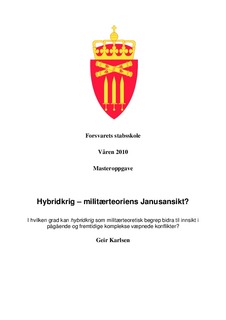| dc.description.abstract | This thesis examines the theoretical construct of hybrid war, a newly introduced concept for
rethinking modern complex conflicts. The study departs from the following research question:
“How is hybrid war understood, and to what extent does the hybrid war construct support a
useful perception of contemporary and prospective armed conflicts?” The aim of the study is
twofold: Firstly, to conceptualize the term hybrid war, both by defining the context, and by
suggesting a framework for analysis. And, secondly, to analyse whether this theoretical
construct contributes to a useful and substantial insight for understanding ongoing and
emerging armed conflicts of our time.
The working method comprises an extensive analysis of written material on military theory
such as books, reports and monographs, in addition to historical and contemporary studies, as
well as articles and a variety of internet sources. Additionally, a two-case empirical study – on
the Second Lebanon War in 2006 and the Russo-Georgian War in 2008 respectively – is
added to evaluate the feasibility of the hybrid war construct as an academic tool.
The thesis suggests that the hybrid war construct provides a useful instrument to examine the
dynamics and logics of a conflict actor’s planning, preparation and execution of armed
resistance and combat operations against a superior high-technology conventional opponent.
As such, the concept emerges within an asymmetric context employing both kinetic as well as
non-kinetic means. A so-called hybrid actor is characterised by one who utilizes capabilities
within the spheres of conventional, irregular, terrorist, and criminal approaches, including
‘soft-war’ approaches like information warfare and cyber-attack. Hybrid war is executed in an
orchestrated “convergence and combination”-like fashion.
By conclusion, the hybrid war construct may pave the way for a new way of thinking with
regards to contemporary armed conflicts, challenging the academic establishment and
encouraging the military policymakers towards a renewed concept development. | en_US |
